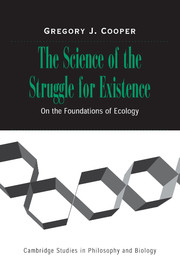Book contents
- Frontmatter
- Contents
- Introduction
- Acknowledgments
- 1 The Struggle for Existence
- 2 The Roots of Controversy
- 3 Must There Be a Balance of Nature?
- 4 The Pursuit of Ecological Generality
- 5 Model Building: A Controversial Craft
- 6 Theoretical Explanation and Fundamental Laws
- 7 The Explanatory Continuum
- 8 Theories, Models, and Explanatory Tools
- Epilogue
- References
- Index
Introduction
Published online by Cambridge University Press: 05 May 2010
- Frontmatter
- Contents
- Introduction
- Acknowledgments
- 1 The Struggle for Existence
- 2 The Roots of Controversy
- 3 Must There Be a Balance of Nature?
- 4 The Pursuit of Ecological Generality
- 5 Model Building: A Controversial Craft
- 6 Theoretical Explanation and Fundamental Laws
- 7 The Explanatory Continuum
- 8 Theories, Models, and Explanatory Tools
- Epilogue
- References
- Index
Summary
Eugene Odum has called ecology the link between the natural and the social sciences. While that may be a little strong, ecology does probably have more in common, conceptually and methodologically, with the social sciences than with any other natural science, and in this respect it occupies a unique position among the span of scientific disciplines. Furthermore, the history of ecology is rich in foundational controversy and philosophical debate. Finally, given ecology's fundamental role in the design and implementation of environmental policy, it is hard to imagine a science that has more social and practical relevance. For these reasons, one would expect ecology to be one of the more visible targets for the philosophy of science. However, philosophers have been slow to turn their attention toward ecology; there has been very little sustained examination of foundational controversies in the discipline. This book contributes toward filling that void. It does so primarily by examining a number of central foundational issues in ecology; in the process, both the nature of ecology as a scientific field and its role in the process of environmental decision making are clarified.
To a first approximation, issues in the philosophy of ecology can be divided into two groups. In one group, the questions are internal. They involve uncertainty over the nature of genuinely ecological questions, conflicting visions of sound ecological practice, and related matters.
- Type
- Chapter
- Information
- The Science of the Struggle for ExistenceOn the Foundations of Ecology, pp. ix - xivPublisher: Cambridge University PressPrint publication year: 2003

